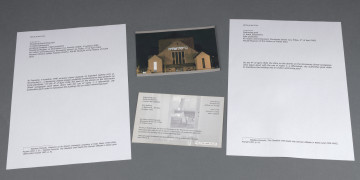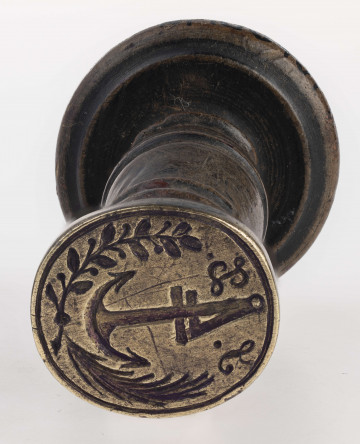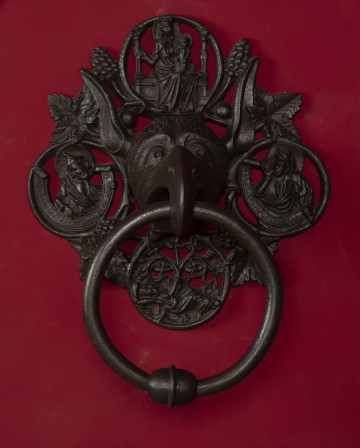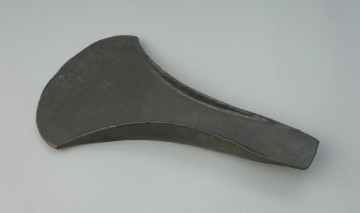
Graphic
2003
Museum of the history of Polish Jews
In April 2003, on the facade of one of the public buildings at the corner of Wroniecka and Stawna streets in Poznań, Rafał Jakubowicz displayed a large phrase in Hebrew, בריכת־שחײה (Brechat schija), which means a "swimming pool". The action took place after dusk to make the letters clearly visible, everything was photographed and recorded by the artist. In the years 1940 - 2011, the building was indeed a swimming pool; however, Jakubowicz wanted to emphasise the original function of the place - a sacred one. It was built over the period from 1905 to 1907 as a synagogue (known as the New Synagogue) and was a house of prayer for the Jewish residents of Poznań until 1940. Then, the Germans decided to convert it into a swimming pool for the Wehrmacht soldiers. This action, supremely utilitarian, was cynically desecrating and was continued after the end of the Second World War. As Andrzej Niziołek writes: “And after the war, its [the synagogue's] desecration was subjected to sanctions by the communist and also by the democratic authorities of the city later on. And the building served as a swimming pool until its technical condition allowed it”. Jakubowicz adds: "[...] 66 years after the war, the swimming pool in the synagogue was almost completely accepted, it became something ordinary and obvious to the people of Poznań. In that sense, the synagogue has become invisible". The selection of the date of the action by the artist was not accidental - it was in April 1940 that the Germans removed the last Star of David from the building, thus stripping it of its visible association with Jewish religion, culture and identity. They have not been restored and recalled so far. The work was created as one of several projects of the artist referring to the subject of the Holocaust in Poznań and Swarzędz, addressing the issues of oblivion, displacement, traces of the heritage of Polish Jews in post-war Poland and their obliteration. Eleonora Jedlińska interprets the work by Jakubowicz suggestively: "The artist confronts himself and the recipients of his work with the past, makes himself and us responsible for the absent dead, and takes up the issue of presenting the past once again". Rafał Jakubowicz turned the recording of the action into a material object - an art installation consisting of a large-format photograph (MPOLIN-M1379/1), a design of a postcard to supplement the exhibition (MPOLIN-M1379/4) and two paradocumentary videos - a recording showing the interior of the building (MPOLIN-M1379/2) and a short documentation of the course of the action (MPOLIN-M1379/3).
Rafał Jakubowicz (born in 1974 in Poznań). A graduate of the Faculty of Artistic Education (1999) and the Faculty of Painting, Graphic Arts and Sculpture (2000) at the Academy of Fine Arts and the Faculty of Neophilology (specialisation: Hebrew language) at the Adam Mickiewicz University in Poznań (2014). From 2013 to 2016, he was a lecturer at the Department of Asian Studies (Section of Hebrew, Aramaic and Karaim Studies) of Adam Mickiewicz University in Poznań. Since 2000, a lecturer at the University of Arts in Poznań, where he currently runs the Studio of Art in Social Space and the faculty "Jewish motifs in contemporary visual culture" as an associate professor. His interest are, among other things, an institutional critique in the field of art, the issues of gentrification, exclusion and exploitation in the period of late capitalism. He addresses the issues of restoring forgotten history, analyses the way the past has an impact on the present. He was a co-curator (together with Dorota Monkiewicz, Christiane Mennicke-Schwarz and Valentina Marcenaro) of an exhibition entitled "Vot ken you mach?" which addressed the issue of Jewish identity in today's Europe, Kunsthaus Dresden (2013) and the Wrocław Contemporary Museum (2015). He collaborates with the Le Guern Gallery in Warsaw, where he recently realised, together with Eliyahu Fatal, an exhibition "Otwarty rachunek" (Unfinished business) (2022). A member of the International Association of Art Critics since 2005. Since 2014, he has been active in Ogólnopolski Związek Zawodowy Inicjatywa Pracownicza (the Workers' Initiative).
Małgorzata Bogdańska-Krzyżanek

19th (?) century
National Museum in Lublin

1. ćwierć XIX wieku
National Museum in Szczecin

around 1600 p.n.e. — 1500 p.n.e.
National Museum in Szczecin
DISCOVER this TOPIC
National Museum in Szczecin
DISCOVER this PATH
Educational path